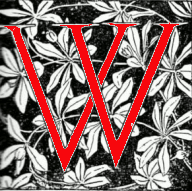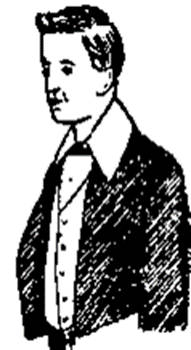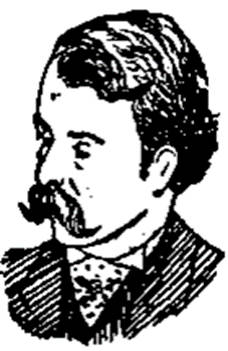This article has been transcribed from a copy of the Cardiff Times in the online collection of scanned Welsh newspapers 1804-1919 in the National Library of Wales, with grateful recognition of the free access accorded to all readers. Paragraph breaks have been introduced for easier reading, and a decorated initial letter has been added.
Samuel wilfully mixes up different sorts of information in making what amounts to an attack on education for the masses as well as to investigative journalism. To equate what we now call 'public information' with gossip is a familiar move in restricting press and political freedom. Samuel further trivialises the subject by attributing requests for information to the supposedly inquisitive nature of women about their neighbours, thus simultaneously espousing a time-worn strategy to restrict information to a privileged class and drawing on an age-old prejudice against women.
The phrase 'wants to know' is frequently repeated in Dickens's Little Dorrit when Clennam seeks information from the Circumlocution Office. There is no sign that Samuel is aware of this, though to an aware reader it locates the refusal to give information to a privileged political class.
The Family Herald was, as its subtitle states, 'A Domestic Magazine of Useful Information & Amusement' (1843–1940). It was a fiction-based paper, which appeared weekly from 1843 to 1940, and originally sold at a penny, though the price later rose to 2d (0.008 GBP). —— David Skilton

ithout the pale of that educational arena where the thirst for information is fostered by Act of Parliament, and where children and their elders are crammed with varied knowledge until they can pass examinations at the rate of 98 and 99 per cent., there exists a class of people who, with no regard to educational advancement, are always wanting to know something. If you volunteer an ordinary piece of information, or tell them the state of affairs in relation to certain events, they do not rest satisfied with the bare statement supplied, but at once ask why such a state of affairs exists. They want to know the cause for each effect of life, and more especially so if it be domestic. Whether they thoroughly attend to their own business may be questioned; but that they take a deep and continual interest in other people’s admits of no possible doubt whatever. You see they want to know, and if some of the means whereby they gain their ends are open to criticism, they do not consider that; and if asked why they thus endeavour to lay bare the skeletons in the domestic cupboards of other people, they invariably give as their illogical reason that they want to know. They ferret out a cause for the actions of their neighbours – They wonder why the Government does not alter its plans in accordance with their own ideas, and they see nothing objectionable in their wanting to know the income and expenditure of their friends and acquaintances. In fact, they ask so many questions and want to know so much that there always seems to be considerable danger of their developing into peregrinating notes of interrogation. Heavy sinners in this respect are the daughters of Eve. It seems to be part of their constitution to annex, during their lives, an unique collection of more or less accurate information about things in general, and their friends in particular. If these ladies were not so fond of 'wanting to know' the tongue of scandal would be silenced and the pleasures of afternoon tea would depart.
From the cradle to the grave the thirst for indiscriminate information is gradually developed; and children are, with less evil results than their elders, great delinquents in the direction of wanting to know. For instance, when Master Johnny, ætat 4, is told that he has become the possessor of a new sister, he at once begins to ask questions, and immediately wants to know where his relative came from? On his nurse, with the absence of veracity usual on such occasions, informing him that the latest addition to the household was found 'under the gooseberry bush'[,] he evinces a desire to know what particular bush it was, and at the same time suggests a. voyage of discovery with a view to possible contingencies in the direction of a further supply of relatives. Should the fairy-tale be that the doctor brought the new arrival with him in his pocket, Master Johnny shows that he has doubts as to the holding capacity of the said pocket and straightway proposes to interview the doctor on the subject. He wants to know. Another species of want-to-know people are the individuals who write to newspapers and weekly journals for information, and who expect to be supplied with it immediately – if not sooner.

Wants to know how to manage her lover.
They expect editors of papers, and especially such papers as are labelled 'domestic,' to be walking catalogues of facts and fashions, periods and passions; and they worry them week after week with queries on every conceivable subject, which they fondly imagine will be answered in their particular paper the same week they send them.
I have lately perused much literature, if it can so be called, of the 'Answers to Correspondents' order, and I cannot but think that the ordinary (and now and then extraordinary) readers who want to know must have a high and reliable opinion of the modern editor. Their faith is a thing to dream about. You cannot shake it. They pour their secret troubles into the editorial ear, as though the literary ruler were a priest, and his office and waste-paper basket but details of the confessional. In this connection readers of the better class sensational weeklies of the 'Family Herald'[i] type are, perhaps, the worst sinners. They fancy the editor of their pet paper ought to be able to advise them on any domestic difficulty they may meet with, and in the matter of love, courtship, and marriage they would sooner take his opinion than that of a dream-book or a gipsy. He ought to feel flattered, but I am much afraid that he will not see the faith in his powers in that way. He hasn't time to go into the niceties of the situation — it takes him all his time to answer the questions sent him each week. Let us glance at one or two queries sent by ladies who are incapable of managing their love affairs and their young men. Here is a damsel who has, apparently, not yet learned the art of hooking her fish. She writes to a popular weekly, and this is the state of affairs she desires the editor to straighten up: —
'In Suspense' has for five years [been?] receiving the attentions of a gentleman, but with hardly any understanding whatever. Now he avoids her. What is she to do? Should she write to him for an explanation? Now as the editor could not possibly know either the young man or 'In Suspense' he could – as he did – only generalise on the state of affairs with the result that his reply left the lady exactly where she was. If correspondents only knew it, the domestic affairs of their editorial idol keep him as fully occupied as it is desirous in the interests of his non-corresponding readers he should be. Married men usually object to being bothered with other people's experience of the unevenness of the path of true (more or less) love. You see they have travelled the road themselves. Still, in spite of good advice and gently administered sarcasm, the correspondent still flourishes and tells his or her tale of blighted affection or broken vows with an objectionable regularity. I am beginning to think that these ill-used lovers and perplexed maidens rather glory in their crosses. It gives them an opportunity of writing to a paper; and I am firmly convinced that they gloat over the replies in the seclusion of their bedrooms, and begin to have a glimmering and fatal suspicion that they may one day become authors and write for the papers. And all the outcome of wanting to know.

Wants to know how to make love to his girl.
Another of the want-to-know order to be avoided is the man who writes queries on etiquette. He is a social terror. Judging from the number of questions this individual asks, one it forced to conclude that he ought not to be allowed out without a guide. If he be as ignorant of the rules of society as his questions suggest, he might in all fairness be expected to take his soup with a fork and peas with his fingers. If his ignorance be not assumed, he may be pardoned for wanting to know.
Then there is the old lady, with money, who wants to know how to make a will, and who never seems struck with the idea that she might consult a solicitor, who would not only relieve her anxiety in the present, but prevent litigation in the future. Possibly the old lady has no belief in the lights of the law, and prefers to dispose of her goods and chattels without the aid of a solicitor. Well, experience has taught, ere this, that men of law are not the pleasantest things to have about the house. They, too, frequently want to know.

Wants to know why his question is not answered.
Correspondents who ask the same questions are numerous, and the phrase 'upwards of a hundred' seems to trouble the minds of not a few of them, for they ask the meaning of it unceasingly. Heights of mountains, depths of rivers, the age of actresses, and the value of shares are all things that people want to know through the medium of the papers they patronise. And if they don't get replies they write spiteful letters to the editor. You see they know that editors live out of the public, and they do not wish them to forget the fact.
And thus the world goes round, and people all want to know. From the dazzling halls of light to the humble cottage there is a great and yearning desire to know about things, and people and Lady Geraldine de Montmorency is as eager to know the particulars of her dearest friend[‘]s faux pas as Mrs Mooney, the charwoman is to hear the thrilling details of the latent disagreement between her friends and her neighbours, Mr and Mrs O'Flannigan. The[y?] are both [???] by the same desire, and curiosity is the mainspring which sets them on; and though mischief may result from their desire they do not I generally act from motives of spite. They do it simply and solely because they want to know.
Last modified 9 April 2022